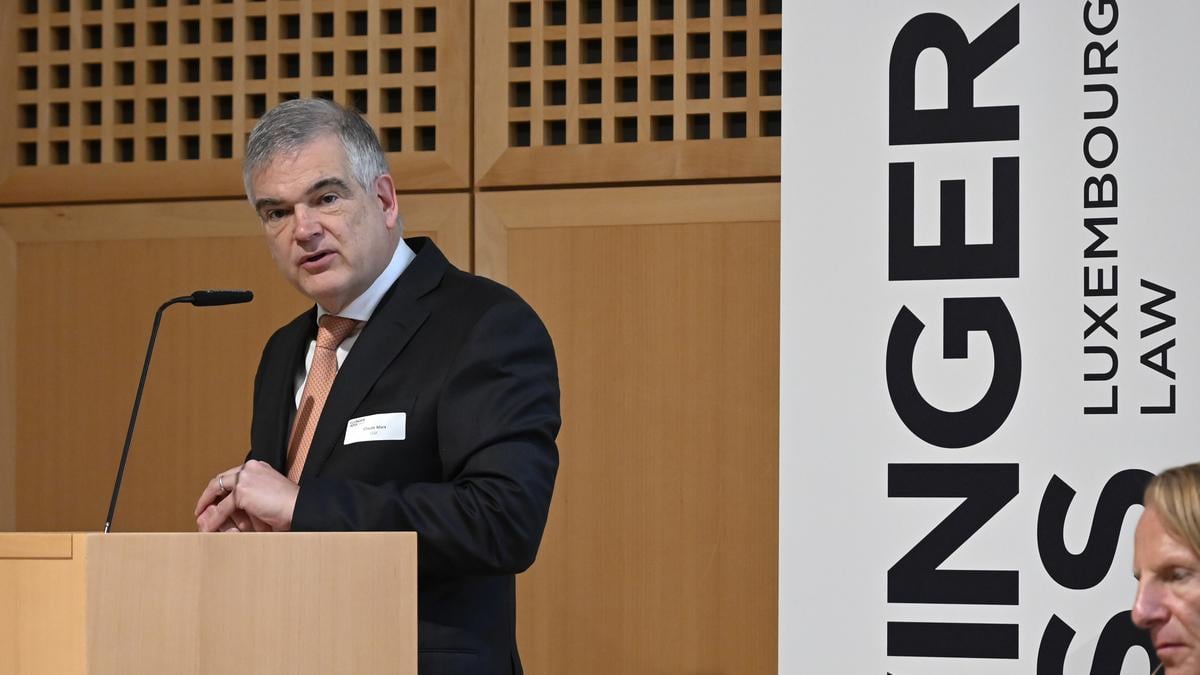Bank profitability has improved, but the sector faces heightened headwinds and more Luxembourg banks are expected to merge or shut down, the Grand Duchy’s top financial regulator has said.
While banks have repeatedly cited the escalating cost and complexity of complying with European, local and international rules, Claude Marx, director general of the Financial Sector Supervisory Commission (CSSF), declared himself “in favour of simplification” but “not in favour of deregulation.”
The comments came during the third annual regulatory forum hosted by the law firm Elvinger Hoss on Wednesday.
Also read:What keeps Luxembourg financial CEOs up at night
“Bank profitability in Europe has historically lagged behind the US and to a lesser extent Asia,” Marx said. Return on equity, a standard measure of profitability, was 10.5% in the US in the fourth quarter of 2025, according to Marx.
The average rate for larger European banks, called “significant” institutions, was 9.5%, only one percentage point behind the Americans. For smaller, or less significant, banks across Europe it was 6.9%.
At the end of the first quarter of 2025, average return on equity at Luxembourg banks was 10.3%, Marx said.
US banks have the advantage of “deeper capital markets, higher interest rates and more opportunities to scale,” Marx stated. European banks, on the other hand, face more “capacity” from rivals and greater market “fragmentation”, he said.
We will see further consolidation in banks in Luxembourg and Europe
Claude Marx
Director general, CSSF
There are four primary reasons that banks in Luxembourg could be unprofitable, according to Marx. First, “the limited size of their balance sheet” means they cannot scale their business but still face many of the same fixed operating costs as larger competitors.
Second, “new banks typically make a loss the first five years” after they enter the market. Thirdly, the bank could be an internal “service provider” for a larger corporate group, meaning that the local banking unit’s profits are less important than the group’s overall bottom line.
Finally, the bank could be making “substantial investments in technology,” such as “replacing core banking systems” or in cloud computing and AI systems, he said.
Expected consolidation
The net number of banks in Luxembourg has gone down by 30, from 148 to 118, over the past decade, Marx said. At the same time, balance sheets and assets under management have “quite significantly increased.”
“We will see further consolidation in banks in Luxembourg and Europe,” Marx predicted. Given the market, “future consolidation is necessary.”
“Profitability is important,” Marx said, because it allows banks “to build capital buffers” and resist financial shocks, to “invest in innovation” and to “remain attractive to investors” who must stand by banks over the long-haul to ensure their stability.
High profits can indicate excessive “risk taking” or market power, “not necessarily resilience,” he said.
Also read:Luxembourg financial regulator signs AI agreement
Increased competition
“Banks face growing competition from fintechs and big techs,” who bring big budgets and balance sheets to the table.
Banks have been investing heavily in IT infrastructure and cybersecurity, “which is happening, but in my opinion should be improved,” Marx said. Many innovative solutions are available on the market and are “not always expensive” to implement.
The European banking sector is stronger and more competitive than a year ago
Claude Marx
Director general, CSSF
Slimming the rulebook
“It is good to have regulation, but not all regulation has proven to be effective,” said Marx. Rulemakers need to get better at reforming, replacing or abolishing regulations, he conceded.
“We should have more principle-based rules,” as opposed to proscribed procedures, Marx said. “But we have to acknowledge that we have a thick rulebook because we don’t trust each other in the EU.” In other words, member states want rules to reign each other in.
Marx has been pleased with the initial steps taken in Brussels to streamline regulations and encouraged Luxembourg financial firms to participate in the public feedback process. However, Luxembourg players need to identify and focus on a few top priorities that most urgently need reforms and not put forward 50 proposals that will take five years for the European Commission to review, he warned.
Conference speakers Henri Wagner of Elvinger Hoss (second from left), ex-Deutsche Bank executive Hugo Banziger, Françoise Thoma of Spuerkeess, Mario Pirola of Pictet, independent director Norbert Becker and Pit Reckinger at Elvinger Hoss listen to
Claude Marx of the Luxembourg financial regulator CSSF (on left) speak at the law firm’s annual regulatory forum on 4 June 2025 © Photo credit: Chris Karaba
Attendees are seen during the annual regulatory forum hosted by the law firm Elvinger Hoss, held at Mudam, on 4 June 2025 © Photo credit: Chris Karaba
Claude Marx, director general of the Financial Sector Supervisory Commission (CSSF), is seen speaking at the Elvinger Hoss Annual Regulatory Forum on 4 June 2025 © Photo credit: Chris Karaba
Positive, but not easy outlook
In recent years, European “banks have withstood Covid”, war erupting on the continent, the failure of Credit Suisse and several notable US banks, and an “increased frequency and severity of cyberattacks” which Marx observed are often state-backed. Falling interest rates will put pressure on profitability and banks increasingly “face climate and nature risks.”
Yet capital reserves are up and non-performing loans are down, Marx observed. “The European banking sector is stronger and more competitive than a year ago.”
